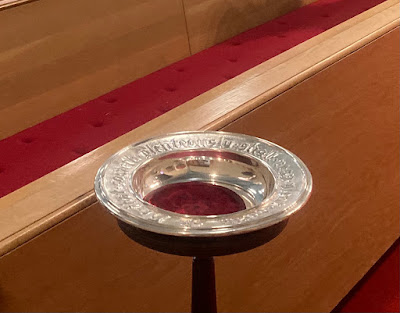This Generous Undertaking
A Sermon for the Fifth Sunday After Pentecost
June 27, 2021
The Rev. Robin Teasley
As you excel in everything - in faith, in speech, in knowledge, in utmost eagerness, and in our love for you - so we want you to excel also in this generous undertaking. I do not say this as a command, but I am testing the genuineness of your love against the earnestness of others. For you know the generous act of our Lord Jesus Christ, that though he was rich, yet for your sakes he became poor, so that by his poverty you might become rich. And in this matter I am giving my advice: it is appropriate for you who began last year not only to do something but even to desire to do something-- now finish doing it, so that your eagerness may be matched by completing it according to your means. For if the eagerness is there, the gift is acceptable according to what one has-- not according to what one does not have. I do not mean that there should be relief for others and pressure on you, but it is a question of a fair balance between your present abundance and their need, so that their abundance may be for your need, in order that there may be a fair balance. As it is written, “The one who had much did not have too much, and the one who had little did not have too little.” 2 Corinthians 8:7-15
There are three things we are never supposed to talk about when in mixed company, and if we were raised in the South, we usually avoid them even in like company. The three things are money, religion, and politics. Apparently, Paul was not familiar with this maxim, or maybe he just ignored it, because in our reading from his second letter to the Corinthians, Paul is not afraid to talk about these things.
In the lazy days of summer, when church financial income is at low ebb, it’s reassuring to remember that even Paul had stewardship issues in his churches. This is not new. It turns out that every generation of Christians has managed to find something else to do with their hard-earned money besides offer it to the work of the body of Christ. Every generation of Christians has struggled to balance their own needs and financial security with the needs of the church. The stewardship sermon is as old as the church itself.
In the verses just before our reading today, Paul shares that the church in Macedonia, the good people over in Philippi, had given abundantly and beyond their means, even in a time of great affliction and poverty. I want to include these verses because they help us understand more fully what Paul was asking of the Corinthians in our text today.
We want you to know, brothers and sisters, about the grace of God that has been granted to the churches of Macedonia; for during a severe ordeal of affliction, their abundant joy and their extreme poverty have overflowed in a wealth of generosity on their part. For, as I can testify, they voluntarily gave according to their means, and even beyond their means, begging us earnestly for the privilege of sharing in this ministry to the saints— and this, not merely as we expected; they gave themselves first to the Lord and, by the will of God, to us, so that we might urge Titus that, as he had already made a beginning, so he should also complete this generous undertaking among you. 2 Corinthians 8:1-6
Paul wrote this because there was a problem in Corinth. The collection that he had anticipated from the church there had not yet materialized. It seems that some of the Corinthians were withholding their financial support from the church. The year before they’d been eager to give, but now their eagerness had waned. For whatever reason, their contributions were not living up to their promises.
Paul doesn’t shame the Corinthians, but he does begin preaching about religion. He helps them understand how money and religion are connected; connected in the way God intended, not in the way today’s society often sees it, or in the way that televangelists use guilt to manipulate giving.
He doesn’t say that his words are a commandment, or that the people are required to give in order to be included in the body of Christ. Paul doesn’t suggest that things would go better with them if they only gave more money.
Instead, Paul writes to them about grace. He reminds them of the gospel story, and he tells them about Jesus. He reminds the Corinthians who they are and grounds their generosity in the incarnation. “For you know the generous act of our Lord Jesus Christ, that though he was rich, yet for your sakes he became poor, so that by his poverty you might become rich.”
Paul then asks the Corinthians to excel in this act of grace along with Christ, along with the other Christian communities. The Greek word Paul uses for grace is charis, and it’s used a number of times in this text, although it’s translated in various ways – as grace, privilege, and generous. It can be enlightening to read through this passage, substituting the word grace for these other words. Paul is teaching us that giving financially is a means of grace, a way that we can share God’s grace with those in need.
And this is where Paul brings politics into the conversation. Or at least it
sounds like that to us. When we hear with our 21st century ears phrases like “it is a question of a fair balance between your present abundance and their need, so that their abundance may be for your need,” we think it sounds like socialism. And when Paul quotes from Exodus concerning the manna God provided in the wilderness saying, “The one who had much did not have too much, and the one who had little did not have too little” our political minds begin to fear too much government control over our hard-earned wealth.
But this was not Paul’s intent at all. He was not speaking of human kingdoms but of God’s kingdom. Paul was reminding the people of where all wealth originates, and from whom all blessings flow. He was proclaiming that all that we are and all that we have is pure grace, privilege, and generosity from the God who longs to give us everything so that we might share it with one another.
This suggests that generosity, this charis or grace, is not a calculation in which we weigh what we are giving up against what we gain. It’s not about what we want or think we deserve in return for making ourselves available to the work of God’s kingdom. Rather, it is a mark of our identity in Christ. When we are baptized into the One who is self-emptying we take on that self-emptying generosity as part of our identity in Christ. It becomes who we are, a generously giving member of the body of Christ.
Faith-filled generosity is a sign of a people who know the gospel, who remember who they are, and who are determined to share in the life that Christ so generously offers.
As a church, we can calculate our income and expenses and create a balanced budget, but that is not our challenge. Our challenge is about being who we are called to become in Christ. Our challenge is to see where more grace is needed in the kingdom and find ways to share it.
Our Vestry is taking time each month to better define our resources and explore how we might best use them to pour the grace God has given us into places of great need in the kingdom, in the world around us. We can do this only as each one of us shares God’s grace.
We have been invited into this generous undertaking as each is able. Paul is clear that if the eagerness is there, the gift is acceptable according to what one has, not according to what one does not have. The larger gifts offered by the wealthier members of the community are not more excellent than the smaller gifts given by those of more modest means, because grace is not measured in dollars given but by the desire and eagerness to give.
We have been given grace upon grace through Christ. May we take some time to reflect on this grace as we have received it in our lives, and then think about the ways our own offerings to God are filled with this grace. May we also excel in this generous undertaking.










Comments
Post a Comment